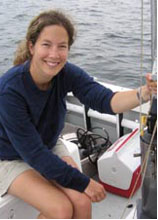Lead Investigator: Wally Fulweiler, Boston University Marine Program
Funding Source: MIT-Seagrant
 The negative consequences of excess nutrient loading alter estuarine sediment nutrient cycling in general and the production of methane in particular. On a per molecule basis, the impact of methane on climate is over 20 times greater than carbon dioxide (over a 100 year period). And even though estuaries make up a small portion of the total global ocean area they contribute about 10% of the total ocean methane emissions. Thus, quantifying how the production of methane in estuaries changes seasonally and spatially is an important step in our understanding of coastal systems and future climate. The purpose of this ongoing research is to quantify sediment methane production in Waquoit Bay, MA and to determine how low oxygen conditions alter these rates. To do this we collect sediment cores at four sites exposed to varying oxygen conditions in the Waquoit Bay system and measure methane fluxes across the sediment-water interface. Additionally, we will conduct experimental manipulations where we alter the oxygen conditions in the overlying water to see how this impacts methane fluxes. For more information please go to: www.fulweilerlab.com and follow us @Fulweilerlab.
The negative consequences of excess nutrient loading alter estuarine sediment nutrient cycling in general and the production of methane in particular. On a per molecule basis, the impact of methane on climate is over 20 times greater than carbon dioxide (over a 100 year period). And even though estuaries make up a small portion of the total global ocean area they contribute about 10% of the total ocean methane emissions. Thus, quantifying how the production of methane in estuaries changes seasonally and spatially is an important step in our understanding of coastal systems and future climate. The purpose of this ongoing research is to quantify sediment methane production in Waquoit Bay, MA and to determine how low oxygen conditions alter these rates. To do this we collect sediment cores at four sites exposed to varying oxygen conditions in the Waquoit Bay system and measure methane fluxes across the sediment-water interface. Additionally, we will conduct experimental manipulations where we alter the oxygen conditions in the overlying water to see how this impacts methane fluxes. For more information please go to: www.fulweilerlab.com and follow us @Fulweilerlab.

